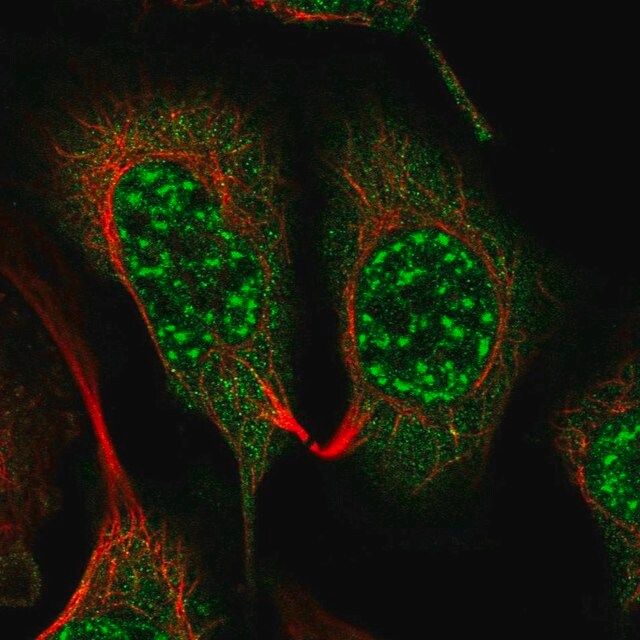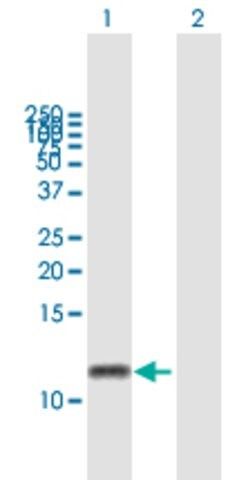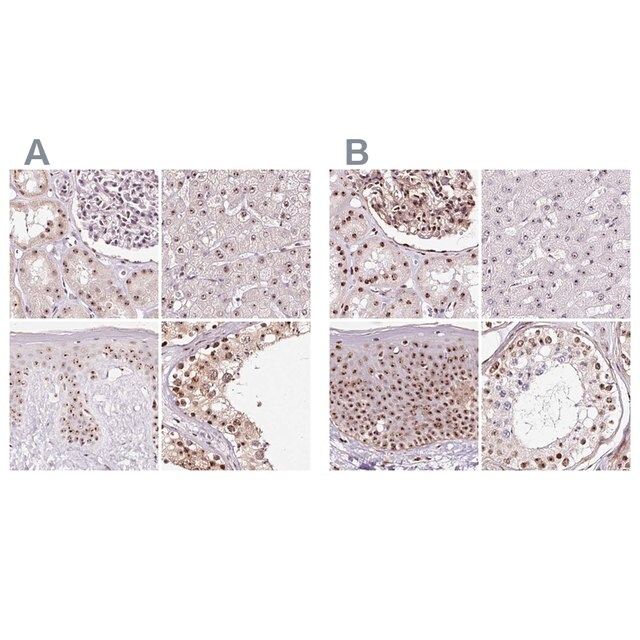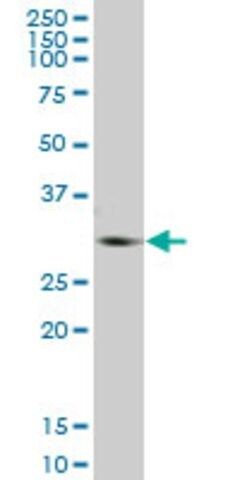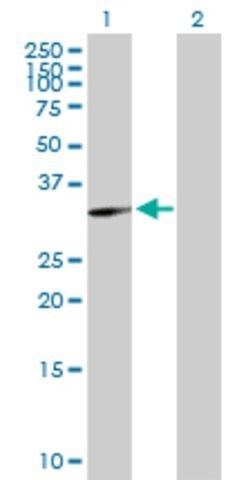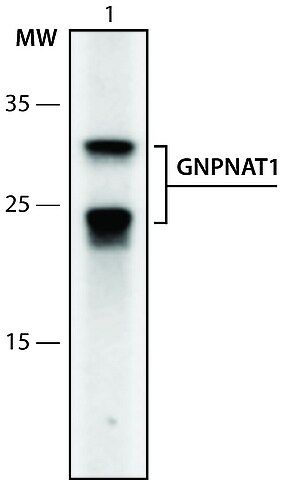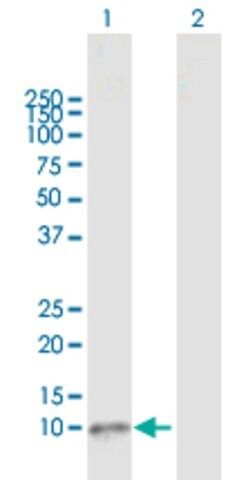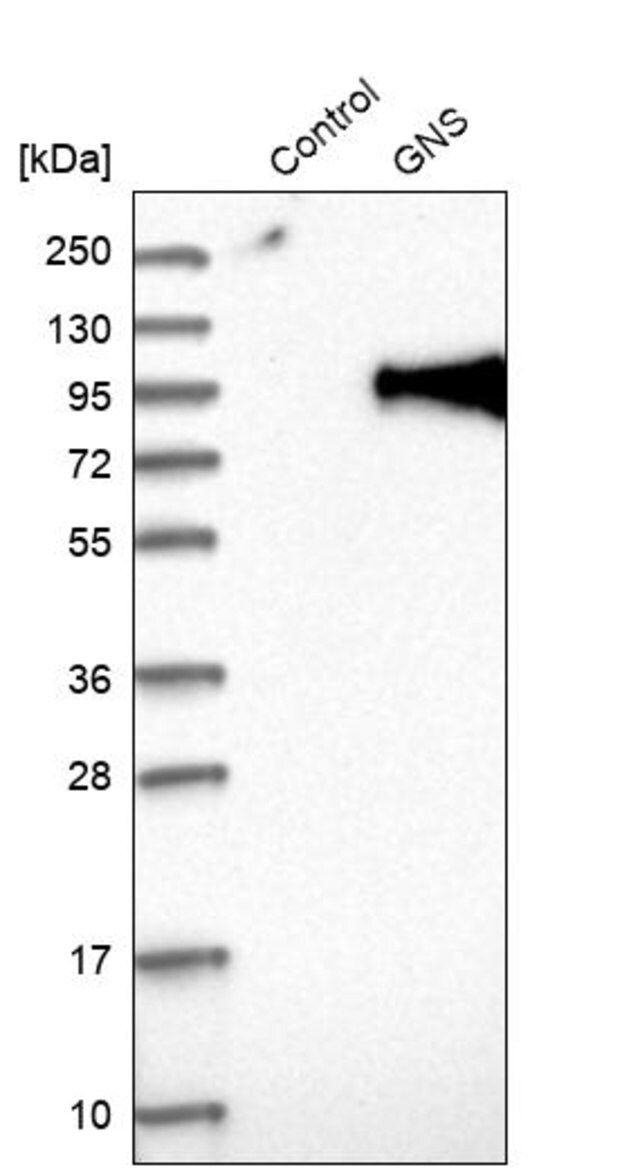产品说明
一般描述
Gutamic acid decarboxylase (GAD; E.C. 4.1.1.15) is the enzyme responsible for the conversion of glutamic acid to gamma-aminobutyric acid (GABA), the major inhibitory transmitter in higher brain regions, and putative paracrine hormone in pancreatic islets. Two molecular forms of GAD (65kDa and 67kDa, 64% aa identity between forms) are highly conserved and both forms are expressed in the CNS, pancreatic islet cells, testis, oviduct and ovary. The isoforms are regionally distributed cytoplasmically in the brains of rats and mice (Sheikh, S. et al. 1999). GAD65 is an ampiphilic, membrane-anchored protein (585aa), encoded on human chromosome 10, and is responsible for vesicular GABA production. GAD67 is cytoplasmic (594aa.), encoded on chromosome 2, and seems to be responsible for significant cytoplasmic GABA production. GAD expression changes during neural development in rat spinal cord. GAD65 is expressed transiently in commissural axons around E13 but is down regulated the next day while GAD67 expression increases mostly in the somata of those neurons (Phelps, P. et al. 1999). In mature rat pancreas, GAD65 and GAD67 appear to be differentially localized, GAD65 primarily in insulin-containing beta cells and GAD67 in glucagon-containing (A) cells (Li, L. et al. 1995). GAD67 expression seems to be particularly plastic and can change in response to experimental manipulation (for example neuronal stimulation or transection) or disease progression and emergent disorders like schizophrenia (Volk et al., 2000). Colocalization of the two GAD isoforms also shows changes in GAD65/GAD67 distributions correlated with certain disease states such as IDDM and SMS.
特异性
Recognizes the lower molecular weight isoform of the two GAD isoforms identified in brain (Gottlieb, et al., 1986; Chang & Gottlieb, 1988). This monclonal antibody can be used for immunohistochemical localization in brain or pancreas. Anti-GAD has also been used to label purified GAD on Western blots (Chang & Gottlieb, 1988).
免疫原
Purified rat brain GAD.
应用
Anti-Glutamate Decarboxylase Antibody, 65 kDa isoform, clone GAD-6 is an antibody against Glutamate Decarboxylase for use in IH & WB.
Immunohistochemistry: (≤ 1 μg/ml) Optimal working dilutions must be determined by end user.
Immunohystochemical Staining Procedures
The following procedure was developed to localize GAD in rat brain sections of cerebellum. Perform all steps at room temperature unless otherwise indicated. Where normal serum is indicated, use normal serum from the same species as the source of the secondary antibody.This procedure represents suggested guidelines for the use of anti-GAD. Fixation regimen, antibody concentrations, and incubation conditions for a given experimental system should be determined empirically.
1. Perfuse rats with 100 mM phosphate buffer, pH 7.4, containing 1% paraformaldehyde, 0.34% L-lysine, and 0.05% sodium m-periodate (1% PLP).
2. Postfix brains in 1% PLP for 1-2 hours. Longer fixation times may reduce labeling intensity.
3. Transfer brains to 100 mM phosphate buffer containing 30% sucrose, and gently agitate on a shaker platform at +4°C for 48-60 hours.
4. Using a sliding microtome, cut 30 mm sections of frozen cerebellum. As the sections are cut, collect them in a vial of cold 100 mM phosphate buffer.
5. Incubate sections in phosphate-buffered saline (PBS) containing 1.5% normal serum and 0.2% TritonX-100 for 30 minutes.
6. On a shaker platform, incubate sections with anti-GAD (diluted in PBS containing 1.5% normal serum and 0.2% Triton X-100 to a final antibody concentration of 1 mg/ml) for 12-36 hours at +4°C.
7. On a shaker platform, rinse sections eight times, 10-15 minutes per rinse, in PBS.
8. Detect with a standard secondary antibody detection system (Hsu et al., 1981; Falini & Taylor, 1983; Harlow & Lane, 1988; Taylor, 1978).
9. Mount sections, dehydrate, and apply coverslips.
Research Category
Neuroscience
Research Sub Category
Neurotransmitters & Receptors
目标描述
65 kDa
外形
Format: Purified
Ammonium sulfate precipitation and DEAE-cellulose chromatography
Lyophilized. Dissolve contents of vial in 100 µL of sterile, distilled water. This results in a final antibody concentration of 1 mg/ml in 10 mM potassium phosphate, 70 mM sodium chloride, pH 7.4 containing no preservatives.
储存及稳定性
Maintain for 1 year at -20°C from date of shipment. Aliquot to avoid repeated freezing and thawing. For maximum recovery of product, centrifuge the original vial after thawing and prior to removing the cap.
分析说明
Control
Brain tissue
其他说明
Concentration: Please refer to the Certificate of Analysis for the lot-specific concentration.
法律信息
CHEMICON is a registered trademark of Merck KGaA, Darmstadt, Germany
免责声明
Unless otherwise stated in our catalog or other company documentation accompanying the product(s), our products are intended for research use only and are not to be used for any other purpose, which includes but is not limited to, unauthorized commercial uses, in vitro diagnostic uses, ex vivo or in vivo therapeutic uses or any type of consumption or application to humans or animals.
基本信息
| eCl@ss | 32160702 |
| NACRES | NA.41 |
产品性质
| 质量水平 | 100 |
| 生物来源 | mouse |
| 抗体形式 | purified immunoglobulin |
| antibody product type | primary antibodies |
| 克隆 | GAD-6, monoclonal |
| species reactivity | human, rat |
| manufacturer/tradename | Chemicon® |
| technique(s) | immunohistochemistry: suitable western blot: suitable |
| 同位素/亚型 | IgG2a |
| NCBI登记号 | NM_000818.1 |
| UniProt登记号 | Q05329 |
| 运输 | dry ice |
| Gene Information | human ... GAD2(2572) |
安全信息
| 象形图 |  |
| 警示用语: | Warning |
| 危险声明 | H302 + H312 + H332 - H412 |
| 预防措施声明 | P261 - P273 - P280 - P301 + P312 - P302 + P352 + P312 - P304 + P340 + P312 |
| 危险分类 | Acute Tox. 4 Dermal - Acute Tox. 4 Inhalation - Acute Tox. 4 Oral - Aquatic Chronic 3 |
| 储存分类代码 | 13 - Non Combustible Solids |
| WGK | WGK 3 |
| 闪点(F) | Not applicable |
| 闪点(C) | Not applicable |




